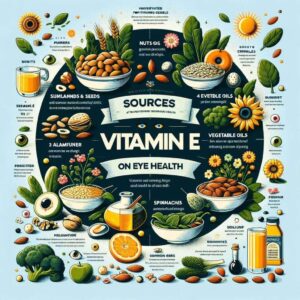Role of Vitamin E in Eye Health
Vitamin E, a fat-soluble nutrient found in various foods and supplements, plays a crucial role in maintaining overall health, including Vitamin E in Eye Health. This essential vitamin is known for its antioxidant properties, which help protect cells from damage caused by free radicals. In the context of eye health, the benefits of vitamin E are particularly significant.
The Fundamental Role of Vitamin E in Eye Health
Antioxidant Impact
Vitamin E’s primary function in eye health is as a potent antioxidant. The eyes, constantly exposed to light and oxygen, are especially prone to oxidative stress. Vitamin E’s role is critical in safeguarding ocular cells from free radical damage, which can impede the progression of disorders such as age-related macular degeneration (AMD) and the formation of cataracts.
Combating Age-Related Macular Degeneration (AMD)
AMD, an ocular condition impacting the macula, the central part of the retina, is a prevalent concern. Diets rich in antioxidants, including Vitamin E, are suggested to mitigate the risk of AMD development.
Cataract Mitigation
Cataracts, which cloud the eye’s lens, often arise with age. Vitamin E, as an antioxidant, is believed to forestall or slow cataract progression through its protective effect against oxidative harm to the lens.
Sources of Vitamin E in Eye Health

Vitamin E is naturally present in a variety of foods. Some of the best sources include:
- Nuts and seeds (such as almonds and sunflower seeds)
- Vegetable oils (such as sunflower, safflower, and wheat germ oil)
- Green leafy vegetables (like spinach and broccoli)
- Fortified cereals and fruit juices
Benefits of Vitamin E in Eye Health
- Protection Against Free Radical Damage: The antioxidant properties of Vitamin E play a crucial role in protecting eye tissues from free radicals. Free radicals are unstable molecules that can damage cells, contributing to ageing and various health issues. By neutralizing these free radicals, Vitamin E helps protect the delicate tissues of the eyes.
- Reduced Risk of Age-Related Macular Degeneration (AMD): AMD is a common eye condition that can lead to vision loss in older adults. Research suggests that antioxidants like Vitamin E, especially when taken in combination with other vitamins and minerals (like Vitamin C, zinc, and beta-carotene), can help reduce the risk of developing advanced AMD.
- Cataract Prevention: Cataracts, characterized by the clouding of the lens in the eye, are another common age-related eye issue. Studies have indicated that the antioxidants in Vitamin E may help prevent or slow the progression of cataracts. This prevention is thought to occur because Vitamin E protects the cells of the lens from oxidative stress, which can lead to cataract formation.
- Supports Healthy Eye Function: Vitamin E is essential for maintaining healthy cells, including those in the eyes. It contributes to overall eye health and function.
- Complementary Benefits with Other Nutrients: When combined with other nutrients like Vitamin C, zinc, and omega-3 fatty acids, Vitamin E can offer more comprehensive eye health benefits. These nutrients work synergistically to support eye health.
- Improved Dry Eye Symptoms: Some studies suggest that Vitamin E can help improve symptoms of dry eye. In this condition, a person doesn’t have enough quality tears to lubricate and nourish the eye.
Recommended Daily Intake
The recommended daily allowance (RDA) for Vitamin E varies based on age, sex, and other health conditions. Generally, adults require about 15 milligrams (mg) per day. It’s always best to try to get the vitamin through food sources, although supplements are available if necessary. However, high doses of Vitamin E supplements can pose health risks, so it’s important to consult with a healthcare provider before starting any new supplement regimen.
Conclusion
The role of maintaining Vitamin E in Eye Health is significant, especially in preventing or slowing age-related conditions like AMD and cataracts. By incorporating Vitamin E-rich foods into a balanced diet, individuals can proactively contribute to the long-term health of their eyes. Always consult with healthcare professionals for personalized dietary advice before beginning any supplement regimen. Remember, a healthy diet benefits not just your eyes but your overall well-being.
This article provides a comprehensive overview of Vitamin E in eye health and Vitamin E’s benefits, emphasizing its antioxidant properties and the importance of a balanced diet. For more detailed or specific medical advice, always refer to a healthcare professional.


